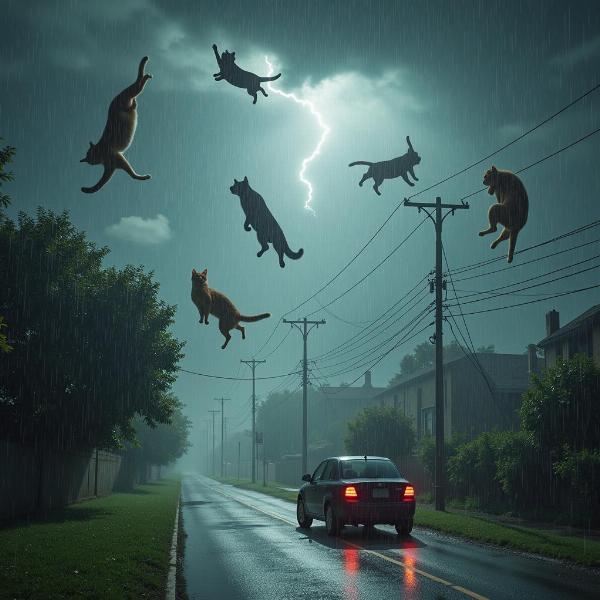Understanding the “cats and dogs” idiom, especially its equivalent in Hindi, can be tricky. This idiom doesn’t literally refer to our furry friends, but rather to heavy rain. This article will delve into the meaning and usage of this quirky idiom, exploring its Hindi counterparts and cultural context. You’ll learn how to use it correctly and even discover related expressions.
Unraveling the “Cats and Dogs” Idiom
The English idiom “raining cats and dogs” describes a downpour. Its origins are debated, but some believe it stems from old English myths where cats were associated with heavy rain and dogs with wind. Another theory points to the unfortunate image of dead animals being washed away during floods. Regardless of its origin, it’s a common way to describe torrential rain. But what about its Hindi equivalent?
 Visualization of the "Raining Cats and Dogs" Idiom
Visualization of the "Raining Cats and Dogs" Idiom
Hindi Equivalents of “Raining Cats and Dogs”
In Hindi, there isn’t one perfect translation, but several expressive phrases capture the essence of heavy rain. Some common examples include:
- “Musladhaar baarish” (मुसलाधार बारिश): This directly translates to “torrential rain” and is a widely understood and used phrase.
- “Jhoron ki baarish” (झरों की बारिश): This describes rain coming down in buckets, emphasizing the intensity of the downpour.
- “Baarish ki jhadi” (बारिश की झड़ी): Meaning a “shower of rain,” this phrase depicts a sudden and heavy burst of rain.
These phrases, while not literal translations, effectively convey the same meaning as “raining cats and dogs.” They are more commonly used in everyday conversation than any literal translation would be.
Cultural Context and Usage
While the “cats and dogs” idiom might be common in English, using a literal Hindi translation would sound strange. Stick to the Hindi equivalents mentioned above for natural-sounding conversations. Imagine describing a monsoon downpour to a friend in India – you’d likely use “musladhaar baarish” instead of a confusing literal translation. Understanding this cultural nuance is key to effective communication.
Related Idioms and Expressions
Just as English has other rain-related idioms, Hindi offers a rich vocabulary to describe various types of rainfall. For example, “Phuhaar” (फुहार) describes a light drizzle, while “Bochhaar” (बौछार) refers to a short, heavy shower. Exploring these nuances adds depth to your understanding of the language and culture.
When “Cats and Dogs” Gets Lost in Translation
Directly translating idioms often leads to humorous, sometimes nonsensical, results. Imagine translating “it’s raining cats and dogs” word-for-word into Hindi – it would likely elicit confused stares. This highlights the importance of understanding idiomatic expressions within their cultural context.
Why Understanding Idioms Matters
Learning idioms enriches your language skills and provides a deeper cultural understanding. It allows you to communicate more effectively and appreciate the nuances of different languages. So next time you encounter heavy rain, remember the Hindi equivalents and avoid a literal “cats and dogs” translation!
Conclusion
The “cats and dogs” idiom, while visually evocative in English, requires a different approach in Hindi. Using phrases like “musladhaar baarish” ensures clear communication and demonstrates cultural sensitivity. Understanding the context and using appropriate equivalents is key to mastering any language. Now you’re equipped to describe a downpour like a native Hindi speaker!
FAQ
- What does the idiom “raining cats and dogs” mean? It means it’s raining very heavily.
- What is the Hindi equivalent of “raining cats and dogs”? Common equivalents include “Musladhaar baarish,” “Jhoron ki baarish,” and “Baarish ki jhadi.”
- Why can’t I directly translate “raining cats and dogs” into Hindi? Direct translation would sound unnatural and confusing, as it’s an idiom, not a literal description.
- What are other Hindi words for different types of rain? “Phuhaar” describes a drizzle, while “Bochhaar” refers to a short, heavy shower.
- Why is it important to learn idioms? Idioms enhance language skills and provide cultural insight, allowing for more effective communication.
Meaning-Hindi.in is your premier resource for professional Hindi translation services. We specialize in a wide range of translation needs, from business and legal documents to technical manuals, website localization, educational materials, and more. Our expert linguists ensure accurate and culturally sensitive translations, bridging the language gap for you. Need a document translated quickly? We offer expedited translation services to meet tight deadlines. Contact us today for a free quote! Email: [email protected], Phone: +91 11-4502-7584 or visit Meaning-Hindi.in.